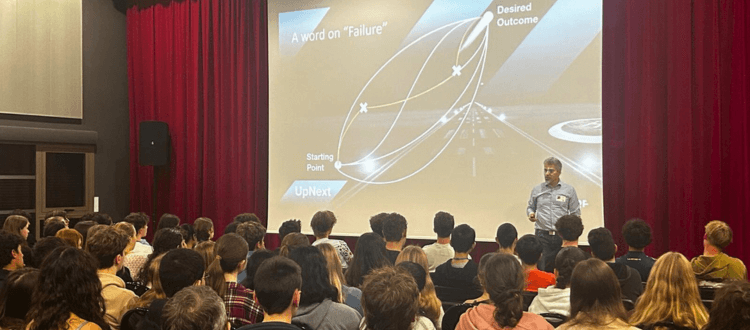Michael Augello, CEO of Airbus UpNext: Achieving Success Through Mistakes
Michael Augello, CEO of Airbus UpNext, captivated the senior students of DST and IST with an inspiring presentation on the courage to take risks and the importance of viewing setbacks as learning experiences.
In the following interview, he shares his personal experiences and offers practical advice on how to turn setbacks into valuable lessons and leverage them as drivers for innovation.
Why do you think it is important for young people to learn that failure is part of the process?
Failure has a bad reputation because it often suggests that something has gone terribly wrong. The presentation began with the question, “What emotions come to mind when you hear the word ‘failure’?” Interestingly, the responses from the audience included not only “fear,” “frustration,” and “shame,” but also “motivation” and “inspiration.”
First, we need to distinguish between failure as an “accident” and failure as an “experiment.” The former should always be avoided. In the aviation industry, for example, we place great emphasis on safety culture, protocols, and training to prevent accidents.
However, failure during experimentation is different—it simply means an unexpected outcome occurred. And when you’re trying something new, that’s part of the process. This “unexpected result” often brings valuable insights. What exactly happened? What would we do differently next time? And what lessons can we share with others?
At Airbus UpNext, we operate on extremely ambitious timelines and assume that not everything will go according to plan. We can’t foresee every possible scenario because we’re exploring uncharted territory. This means we need to embrace failures and pinpoint their value. Each setback provides extremely useful insights that feed into the next iteration of our experiment.
How can students learn to draw strength from setbacks?
It’s easier said than done—but it’s absolutely essential. First of all, it’s completely okay to feel upset or frustrated after a setback. Once that initial reaction has passed, curiosity should take over: “What can I learn from this?” When failure is seen as a “stopover” on the road to new insights, it can become a source of great strength.
Everyone processes and “files away” such experiences differently. Personally, I start by putting the event into a global context, discussing it with close colleagues, and then having a laugh at my own expense. Once that’s done, I naturally begin looking for the positive takeaway.
This means it’s worth investing a bit of time after a setback to get to know yourself better. Reflection and open conversations with those around you are key.
Do you have any tips on how to view failures as valuable experiences?
As mentioned earlier, this comes with practice. Those who have successfully navigated a few setbacks develop a better understanding of themselves and how to manage such situations. Over time, you might even look forward to the insights gained from a failure and use them to drive progress.
At Airbus UpNext, we say “Failure is an option” because it helps us learn quickly. However, the way we respond to failure is critical. Questions like “How did this happen?” or “Who’s to blame?” are unhelpful. Instead, we ask: “What led to this outcome, and what did we learn from it?” or “What can we do better next time?” When this approach is applied consistently, you create an environment where experimentation and progress can happen without fear.
And it’s also closely tied to teamwork. When setbacks are openly shared, colleagues brought on board, and different perspectives considered, the path to a solution becomes much clearer.
What advice would you give students who feel under academic pressure due to setbacks?
A bad grade or a setback can help us do better next time. Key questions to ask could include: What should I do differently? Was I unmotivated? Did I misunderstand the assignment or topic? Are there other reasons why the material isn’t sticking? Who could help me, and who might I collaborate with? Once these factors are understood, it becomes easier to approach the next attempt with clarity.
When it comes to academic pressure, it’s vital that one’s support network—teachers, friends, and parents—creates a space where mistakes are welcomed and seen as ‘learning opportunities. The focus should be on approaching challenges with curiosity and asking the right questions. At the same time, it’s important to provide support, as setbacks often bring feelings of fear, stress, and frustration. Collaboration is key to bouncing back stronger.
What was the most important lesson you learned from a failure?
One of the most important lessons I learned is that there are only 24 hours in a day for a reason, and it’s crucial to be realistic about workload.
I didn’t fully understand this early in my career and, in my youthful enthusiasm, decided to pursue a PhD alongside my full-time job. For the first two years, this juggling act worked reasonably well. However, as I took on more responsibilities at work, it became increasingly difficult to manage.
At first, I put my PhD on hold, and a year later, I made the decision to officially abandon it. It became clear that the 24-hour rule wasn’t going to change, no matter how hard I tried! This was a failure and incredibly frustrating at first, especially after putting two years of work into it. I also worried about how others would perceive me stepping back.
At the same time, it was an opportunity to approach the situation with curiosity. Do I have a pattern of taking on too much? How can I better estimate the workload in advance? How can I listen to my inner voice more effectively?
In hindsight, I learned a great deal about myself and developed new strategies to manage my energy more realistically. These insights have been immensely helpful throughout my career.
And one bonus insight: My friends, family, and colleagues were far more supportive and understanding than I had expected. Sometimes, we’re our own toughest critics!

